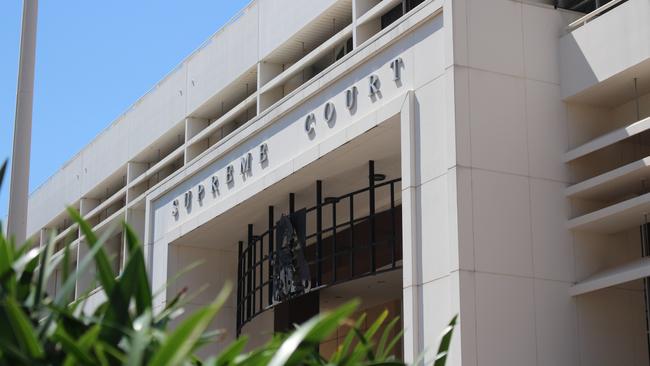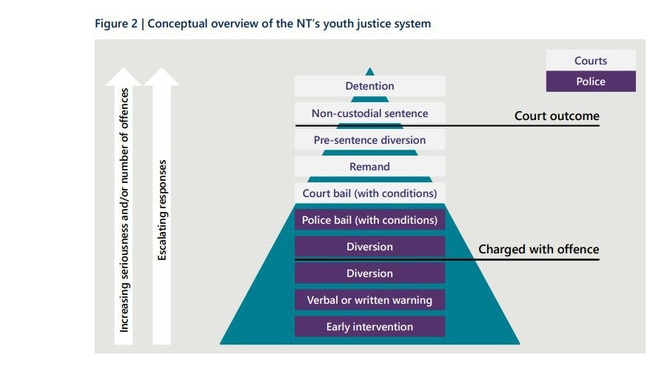Top End teenagers given suspended sentences for savage Bagot Rd, Millner mugging
Two Top End teenagers who suffered appalling childhoods, with dozens of child protection notices and lengthy stints in foster care, have been handed suspended sentences for a frenzied mugging near Jape Homemaker Centre.

Police & Courts
Don't miss out on the headlines from Police & Courts. Followed categories will be added to My News.
Two Top End teenagers who suffered appalling childhoods, with dozens of child protection notices and lengthy stints in foster care, have been handed suspended sentences with no convictions recorded for a frenzied mugging near Jape Homemaker Centre.
The teenage girls, referred to as SK and SR as they cannot be legally identified, pleaded guilty in the Supreme Court at Darwin to a charge each of aggravated robbery.
The defendants, who were aged 16 (SK) and 15 (SR) at the time of the offending, were sentenced earlier this month by Supreme Court Justice Sonia Brownhill.
The court was told the mugging occurred just after 7pm on July 23 last year at Millner’s Jape Homemaker Village.

The victim, a woman, had parked at the village to attend a nearby party, and was walking across Bagot Rd when the teenagers pounced.
They approached the woman from behind, grabbed her handbag, then dragged, kicked and stomped her when she refused to let go of the item.
The mugging ended when a passer-by saw the assault and stopped his car while honking his horn.
The defendants fled after stealing mobile phones belonging to the victim and a friend who was accompanying her.
The assaulted woman sustained “severe bruising and swelling to her face... [and] fractures to her cheek and the bones around her eye,” necessitating surgery.
Turning to the defendants’ individual circumstances, Justice Brownhill noted they both suffered prejudicial childhoods.
Regarding SR, the younger girl, Justice Brownhill said she has a criminal history involving assaulting a worker (twice), aggravated robbery, aggravated assault, theft, and property damage.

The current offending breached a number of good-behaviour bonds.
The judge said SR, an Aboriginal girl from Katherine who lived variously between the Big Rivers capital and Darwin, and her family have been the subject of “multiple” child protection notifications.
They related to “exposure to domestic violence by SR’s father, parental substance abuse, chronic neglect, physical abuse and children engaging in risky behaviours”.
The defendant’s mother has an acquired brain injury from domestic violence, and the six children were taken into care on three occasions.
Her school attendance has been spotty, and teachers have previously raised concerns she has foetal alcohol spectrum disorder and other cognitive impairments, but no assessment has ever been done.
Her family holds strong fears she continues to abuse cannabis but SR is opposed to any form of counselling for substance misuse and addiction.
She has been electronically monitored since October 2024 after being charged and bailed on new offences currently subject to proceedings under the Youth Justice Act 2005.
Her co-offender, SK, the older girl, had no previous criminal history, but suffered a similarly chaotic childhood.
Born in Darwin to parents originally from Borroloola, her father died when SK was seven.
She came to the attention of Territory Families at the age of 11, and there were 37 subsequent child protection notifications relating to “domestic violence, neglect, emotional and physical harm and sexual exploitation”.
In recent months, SK was living in intensive therapeutic residential care, but she was exiled from the program in October due to “anti-social behaviour”.
Both young defendants are strongly opposed to undertaking any form of counselling relating to their past trauma, Justice Brownhill said.
Without recording a conviction, she sentenced SK to seven months’ imprisonment, suspended on condition she be of good behaviour for the duration of the order and be under the supervision of a community youth justice officer.

The other defendant, SR, received similar orders but with 10 months of suspended imprisonment.
Elaborating on her sentences, Justice Brownhill said the Youth Justice Act 2005 holds that actual detention of children was a sentence of “last resort”, while she also had to follow the precedent of Bugmy, which holds that moral culpability is reduced where the defendant has had a childhood of deprivation and neglect.
While there was a need for the sentence to reflect general and specific deterrence of the conduct, the primary consideration under the Youth Justice Act 2005 is the child defendants’ rehabilitation.




